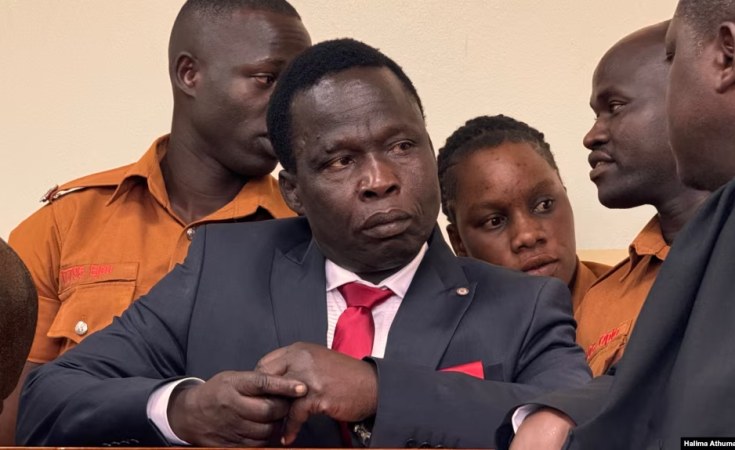Gulu, Uganda — The International Crimes Division of the high Court of Uganda has ordered the government to compensate the victims of convicted former Lord's Resistance Army rebel commander Thomas Kwoyelo.
The ruling delivered on Monday at the Gulu High Court follows an application filed by the victim's counsel and 103 victims demanding reparation from the Attorney General to all victims of Kwoyelo's atrocities.
The victim's lawyers in the application made seven demands, among them a court order for the attorney general to establish the victim trust fund to provide for reparation, compensation for harms suffered and assistance for rehabilitation and rebuilding of victims.
They also prayed to the court to order the attorney general to make annual budgets for the trust fund for victim's reparation, and a symbolic award of 4 million shillings each for all victims.
While highlighting the submission in court on December 6, the victim's representatives reasoned that the liability to pay for reparations is passed on to the State in situation where the perpetrator (Kwoyelo) is indigent.
But the Attorney General represented by Johnson Natuhwera argued that the government is not liable to pay for compensation for crimes committed by private actors.
Natuhwera noted that the reparations award are matters of policy in respect of which government has set up several programmes to address the concerns of the victims.
Justice Duncan Gaswaga, while delivering the reparation order verdict noted that under international and domestic law, the primary obligation to pay reparations to the victims of atrocities is placed upon the convict.
He however said in the event that the reparations are not fully available from the offender or other sources, international law places the obligation upon the state.
According to Justice Gaswaga, atrocities committed on a scale warranting transitional justice is considered a manifestation of a failure on the part of the government that triggers the responsibility for the state to pay reparations to the victims.
"The convict having been found indigent, it is for that reason that the court finds the attorney general responsible for paying reparations to the victims of the offences for which he was convicted," ruled Justice Gaswaga.
Michael Elubu, the lead Judge at the ICD while delivering the court's order noted that the court has considered the applicant's prayers for reparation and ordered the state to compensate each of the victims that suffered harm, loss of property, sexual abuse and death.
Under the category of victims who died as a result of the Kwoyelo's crimes, the court made an award in damages of 10 million shillings for each of the deceased persons while for those who suffered bodily injury the court awarded each 4 million shillings.
The court also made reparation award of 3.5 million shillings for property loss per household for the victims and 5 million shillings each to direct victims of sexual and gender-based violence crimes. In his ruling, Justice Elubu also awarded 3 million shillings for exhumation and decent reburial of victims whose remains were buried in the former Internally Displaced people's camps in Amuru district.
He however noted that the victim's counsel prayers for an order for attorney General to establish a trust fund for victims, make an annual budget for reparation and prepare a draft implementation plan can't be enforced by court since they lack legal framework.
"Having carefully addressed ourselves to these three particular prayers, we find that they intrude on the law making function of the legislative branch of the government and therefore are incapable of being legally enforceable by this court" said Justice Elubu.
He however made declaratory orders for the relevant government institution to pay urgent attention on the lack of an existing legislative framework for the establishment, management and funding of the victims trust fund.
The court has also ruled that other the 103 victims, any eligible applicant wishing to benefit from the reparation order based on the criteria established in its verdict should apply within a period of 360 days.
Johnson Natuhwera, a senior state attorney and lawyer representing the attorney general however made an oral application seeking leave to appeal the decision of the court. He noted that the respondent feels there are issues of the law the court applied to hold the Attorney General liable for paying reparation that requires an appellate court to interrogate further.
"We have an issue with the law and we think and believe, the court of appeal will address its self. This matter requires further interrogation by the higher court so that the Attorney General is given the hearing that is fair enough," submitted Natuhwera.
Justice Stephen Mubiru on his ruling considered the application for leave for the Attorney General citing the ruling hadn't yet been tested in the Ugandan jurisdiction and deserves consideration by the appellate court.
"the court has come to the conclusion that the decision we have just delivered involves novel points of law that has not been tested before in this jurisdiction which deserves consideration by an appellate court. These are substantive matters that deserve to be considered by an appellate court. We have therefore established and are satisfied that it's a proper case we should grant leave of appeal," he ruled.
Kwoyelo a former child soldier who rose to the mid-level ranks of the LRA was sentenced to 40 years in Jail in October this year for committing war crimes and crimes against Humanity between 1993 and 2005 in Kilak County in Present Day Amuru District.


